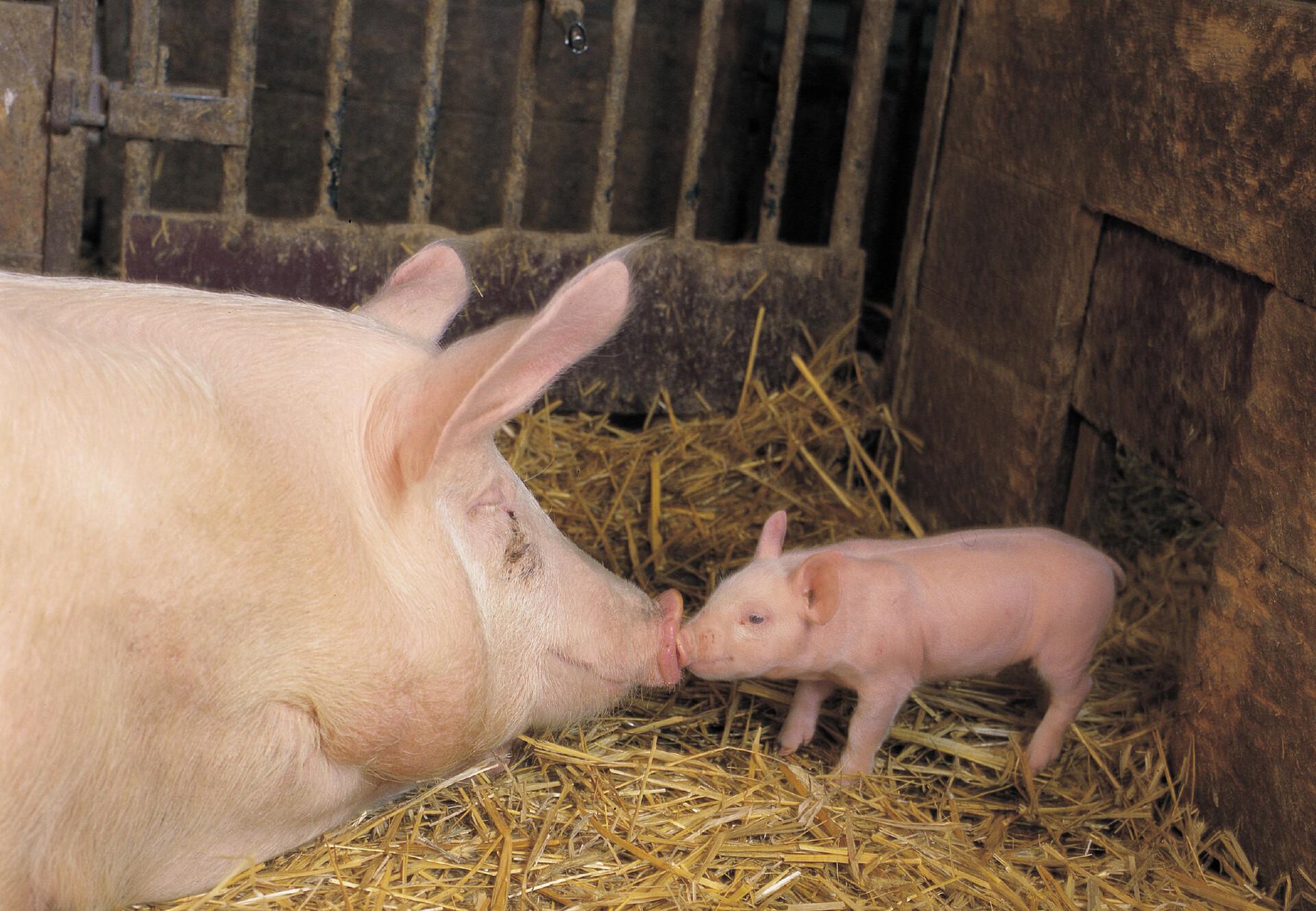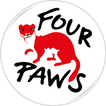
THE NEEDS OF THE DOMESTIC PIG
Biologist Dr. Christian M. Hammer explains what pigs really need
The domestication of pigs began thousands of years ago. Today's approximately 150 breeds of the European domestic pig stem mainly from the European wild boar and crossbreeding with Asian pigs brought to Europe by British seafarers in the eighteenth century. For hundreds of years, pigs were kept in herds on meadows, in woodland or on the streets during the day and driven into sties at night. Intensive pig farming only started after the Second World War.
The natural life expectancy of pigs is around twelve years. However, pigs are usually slaughtered only half a year, at roughly 200 lbs. Breeding sows are killed as soon as they no longer achieve the expected size of litter. This usually happens after a few years.
A pig's basic needs
Pigs have an organised social structure with a strict hierarchy and regulated daily routines. Normally, pigs live in groups of twenty to thirty animals, comprising the mother animals and their offspring. The male animals leave the group after reaching sexual maturity, for a time getting together in separate gangs before ultimately leading a lone existence. They only rejoin the groups during the mating season.
Images of pigs lying or even wallowing in feces in no way correspond to the nature of these animals. On the contrary: pigs forced to live in their own excrement in intensive farming suffer under such conditions.
Because pigs are unable to sweat, they regulate their body temperature through bathing, rolling on cool earth or wallowing. Pigs raised in intensive farming have no opportunity to act out this instinctive behavior. Out of necessity, they try to cool down by splashing their drinking water or by wallowing in their own feces or urine.
Moreover, the combination of the overly warm climate in pig sheds and the increased level of ammonia gas in the air produced by excrement, poses a high health risk for farmed pigs. Cardiovascular problems and respiratory diseases, such as pneumonia, are not uncommon.
In addition, these animals rely on suitable opportunities to scratch. Rubbing removes mud, excrement and parasites. Conditions in intensive farming offer no or completely inadequate facilities for scratching. Permanent itching and unrelieved instincts such as the need to wallow, produce a high level of frustration that often leads to increased aggressiveness towards others in the sty.
The appearance or absence of certain behaviors can inform the schooled eye about whether a form of farming satisfies the basic needs of an animal and can be described as suited to that species. Extensive playing, for example, is a good indicator for positive conditions. Piglets have a particularly strong urge to play, which they love to do in the near-natural conditions of free-range farms. Intensive farming offers neither the space nor adequate opportunities for the piglets to occupy themselves.
The category of 'comfort behavior' includes actions that can be attributed to the sphere of 'body care'. It also encompasses behaviors that express a sense of comfort, agree-ability, sociability and relaxation (for example: yawning, stretching, nesting). But caution is required when assessing comfort behavior. Some gestures such as yawning, stretching or scratching can indicate a switch in behavior triggered by a conflict or hostile situation. When assessing an animal, it is always important to take the whole behavioral context into account. Stereotypical behaviors, self-mutilation, apathy or exaggeratedly aggressive behavior culminating in cannibalism are indicators of inadequate conditions.
Pigs bred in intensive farming very often demonstrate stereotypical behavior. This includes, for example, bar biting, sham chewing, and attempts at foraging. Apathy and excessive aggressiveness caused by permanent stress and a lack of withdrawal opportunities are very common.
Contact and distance to other pigs
Except for older boars, pigs are highly social mammals who have a strong need to stay in contact with other conspecifics. Separating established groups and keeping young animals or sows isolated, causes severe stress to the animal, but both are a common practice in intensive pig farming systems.
Most of the activities are carried out by pigs while in the group, or at least close to the group. Due to the hierarchy, pigs also have situations or activities in which they avoid each other or at least keep a certain minimum distance. Failure to keep the distance, for example when eating, can lead to aggressive behaviour. Such conflicts occur very often in extremely cramped conditions of intensive husbandry because the animals cannot avoid each other. Injuries and a permanently elevated level of stress often occur. Because groups are always reassembled, there is never any peace: newcomers or the 'freeing' of hierarchy positions continuously result in new rank battles.
Need for cleanliness and personal hygiene
The image of a pig lying in faeces or even wallowing in it does not in any way correspond to the natural disposition of the animal. On the contrary: pigs that are forced to live permanently in their own excrement in intensive systems suffer severely from it.
Since pigs cannot sweat, they regulate their body temperature by bathing, rolling, or wallowing in mud. Pigs under intensive husbandry conditions have no way of carrying out these innate behaviours in a manner appropriate to the species. Out of sheer necessity, they try to cool themselves down by splashing drinking water, or by washing in their own faeces and urine.
The combination of a too warm stable climate and an increased, faeces-related ammonia content in the air they breathe, also poses strong health risks for the pigs. Cardiovascular issues and respiratory diseases, such as pneumonia, are not uncommon.
Furthermore, pigs are very dependent on suitable scratching options, as we bred their body form into length, so they are not so flexible anymore as grown-ups. Scrubbing/scratching removes mud, faeces, and parasites. Under intensive husbandry conditions, there are usually no scratching options, or they are inadequate. Permanent itching and the non-satisfaction of innate needs, such as wallowing, lead to a high level of frustration, which often results in increased aggressiveness towards their pen partners.
Indicators of well-being
The appearance or absence of certain behaviours can provide the trained eye with much information about the animal’s welfare. Most importantly, it shows the extent to which an existing form of husbandry satisfies the basic needs of an animal and can be described as appropriate to the species and behaviour. Distinct foraging or play behaviour, for example, can be a good indicator of positive conditions. Piglets, in particular, have a pronounced exploration instinct, which they can perform extensively in natural, free-range husbandry systems. In intensive care, there is neither space nor adequate employment/enrichment opportunities.
The category 'comfort behaviour' means actions that can be assigned to the area of "body care". On the other hand, this also includes behaviours that represent comfort, tolerance, sociability, and relaxation (e.g. yawning, stretching, nesting). However, caution is required when assessing comfort behaviour. Some elements, such as yawning, stretching or scratching, can also be behavioural displacements – that come out of a conflict or an adverse circumstance. It is always important to consider the entire behavioural context when assessing the animal. Stereotypies, self-mutilation, apathetic or exaggeratedly aggressive behaviour up to cannibalism are signs of poor stable conditions.
Stereotypical behaviour can be observed very often in pigs in intensive housing. These include, for example, sham chewing with foamy mouth, tongue rolling and bar- or trough- biting. Apathy and excessive aggressiveness due to constant stress and lack of retreat opportunities also occur very often.




